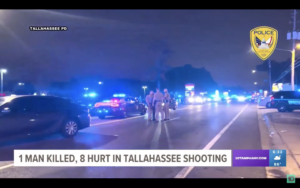
Every day, news and media outlets report a new tragedy that strikes a community. From mass shootings and violent crimes to political bigotry taking place, the general public has grown tired of bad news. A U.S. News & World Report detailing a mass shooting that resulted in the loss of several innocent lives and many others injured is now so common that the public may have become desensitized.
It seems it’s the same thing every week. It starts, “Breaking news, a lone gunman entered the school building and opened fire. Law enforcement officials respond quickly to the scene and engage the shooter, ultimately apprehending them without further harm to the students or faculty.” Unfortunately, by the time the news breaks, the damage is done. Several students and faculty members are tragically killed or injured, continuing the gross cycle and furthering public desensitization.
In the aftermath of back-to-back horrific events, communities are left grappling with a wide range of emotions, including shock, grief, anger, and a growing number of flat or no feelings due to the common recurrences. Now that even more people are noticing the cycle, they are asking how this continues to happen in our country and what can be done to prevent similar incidents in the future. It all boils down to a few things from one key factor, gun control. Fanatic gun supporters, little to no assault gun banning, mental health, and outdated laws are the recipe for devastating headlines.
Several government agencies, universities, and private companies are conducting studies to combat the reoccurring mass shootings by implementing lockdown drills in schools and security systems and raising taxes on firearms. However, those “solutions” only put a band-aid on a bullet wound. It is painfully clear that access to firearms plays a significant role in every tragedy. Like so many others across the country, our community must confront the issue of gun violence and take steps to prevent similar incidents from occurring in the future.
There are many proposals for addressing the issue of gun violence, including increased gun control measures and improved mental health resources. Due to the crisis many institutions, nonprofits, and organizations have stepped forward to provide some type of resources and information. Colorado State University recommends tips for handling tragedy, sourced from the American Psychological Association (APA), and The JED Foundation. The CSU Health Network recommends steps for “dealing with your feelings can strengthen your resilience and help you persevere,” that include not holding it in, turning off the news, and turning your feelings into action.
An article published by the Tampa Bay Times details steps legislatures have taken to improve safety and training in regards to schools. Solutions such as school guardians, banning bumpstocks, and Florida’s “red flag” law are currently in use, but is it enough? It is crucial that our policymakers take swift and decisive action to prevent future tragedies and protect the lives of our citizens.
According to a Virginia bill introduced to the U.S. Senate, the Assault Weapons Ban of 2023 proposal states it “would ban the sale, transfer, manufacture, and import of military-style assault weapons and high-capacity magazines, and other high-capacity ammunition feeding devices.”
In the meantime, communities must unite to support those affected by headlining tragedies and take a stand against assault weapons by voting. After offering condolences to the families and friends of the victims, it is critical to impose laws and resources for catastrophe never to happen again. The resources include counseling, therapy, and other forms of support designed to help individuals cope with the trauma they have experienced and also pass the Assault Weapons Ban of 2023.
While the Second Amendment of the U.S. Constitution guarantees the right to bear arms, we must acknowledge that there are limits to this right. We must take steps to ensure that firearms do not fall into the wrong hands and that individuals who pose a threat to themselves or others do not have access to guns.
In addition to addressing access to firearms, we must address the underlying issues contributing to gun violence. Mental health is a critical component of this issue. Many mass shooters have a history of mental illness or have exhibited warning signs before carrying out their attacks. Addressing these underlying issues may help to prevent future mass shootings.
Improving access to mental health resources, including counseling, therapy, and other evidence-based treatments, can help individuals get the help they need before they reach the point of no return. We must also work to reduce the stigma around mental health and encourage individuals to seek help when they need it.
Finally, we must work to build stronger, more connected communities. Social isolation and a lack of community support can contribute to feelings of despair and hopelessness, which can lead to violent behavior. Building stronger, more connected communities can create a sense of belonging and reduce the risk of violent behavior.
Ultimately, people will continue to be tired of the news and remain desensitized, depressed, and in a state of disregard if reforms are delayed any longer. It is time to start real preventative assault weapon restrictions. Concerts, schools, churches, and club shootings may finally have a chance at decreasing their statistical probability of being involved in a massacre. People won’t be burned out by the same media or even fear going to the grocery store. We must use these tragedies as a catalyst for change. You prevent future incidents of gun violence by addressing access to firearms, improving access to mental health resources, and building stronger, more connected communities.